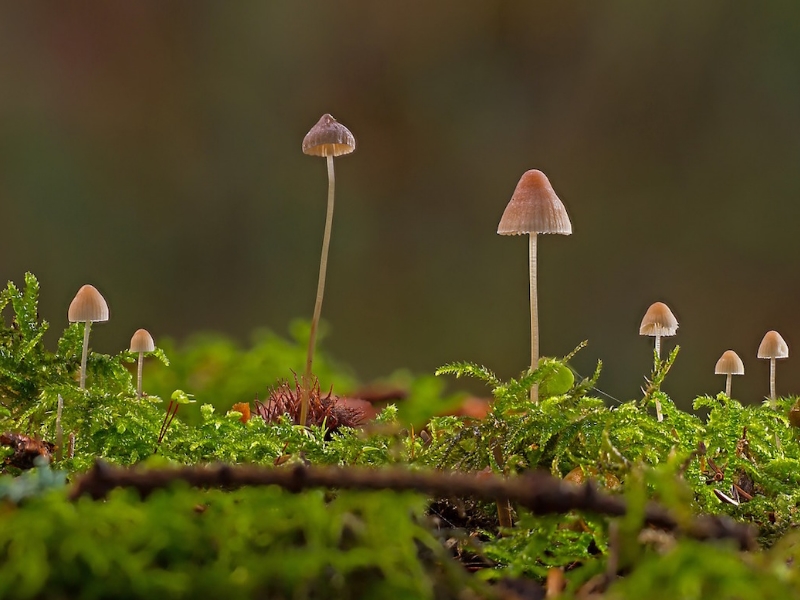Cannabis, CBD, Magic Mushrooms
THC and Neurogenesis: Can Cannabis Support the Growth of New Brain Cells?
For decades, cannabis was largely associated with relaxation, altered perception, and recreational use. However, modern neuroscience has revealed a much more complex picture — one in which compounds like THC (tetrahydrocannabinol) may influence brain health in surprising ways. Among the most intriguing questions is whether THC can support neurogenesis, the process of creating new neurons in the brain.
Neurogenesis primarily occurs in two regions: the hippocampus, which is critical for learning and memory, and the subventricular zone, which influences olfactory function. While the majority of brain cell production happens during development, researchers have discovered that adults also produce new neurons, though at a slower rate. The health of these brain regions can significantly impact cognition, mood, and resilience against neurodegenerative disorders.
The Endocannabinoid System and Brain Health
The human brain naturally produces cannabinoids — molecules that interact with the endocannabinoid system (ECS) to regulate mood, memory, appetite, and more. THC is chemically similar to these naturally occurring compounds, allowing it to bind to cannabinoid receptors, particularly CB1 receptors in the brain.
In animal studies, stimulating these receptors has been linked to increased neurogenesis in the hippocampus. The theory is that THC’s interaction with CB1 receptors could trigger a cascade of biological responses, including the release of brain-derived neurotrophic factor (BDNF), a protein essential for neuron survival and growth.
Evidence from Research
Research on THC and neurogenesis is still in its early stages, and much of it comes from animal studies. For example:
- 2005 study in rodents: Chronic, low-dose cannabinoid administration appeared to promote neurogenesis in the hippocampus.
- 2013 research: Cannabinoid exposure in older mice restored some aspects of cognitive function, suggesting that stimulating the ECS might counteract age-related brain decline.
- Microdosing findings: Low doses of THC showed neuroprotective and anti-inflammatory effects in the brain, whereas high doses sometimes impaired short-term memory and focus.
These findings are promising but not conclusive for humans. Human neurogenesis is harder to measure directly, so most insights rely on indirect markers and cognitive performance tests.
The Role of Dosage and Context
One of the biggest factors influencing THC’s impact on the brain is dosage. While small, carefully managed doses might encourage neurogenesis and improve mood, high doses can produce anxiety, disorientation, or even hinder memory consolidation. This “Goldilocks zone” means that if THC does have neurogenic potential, it likely requires precise use to be beneficial.
Lifestyle factors also matter. Diet, exercise, stress levels, and sleep quality all interact with brain health and neurogenesis. For instance, aerobic exercise has been shown to enhance hippocampal neurogenesis on its own, and pairing it with mindful THC use could potentially amplify effects.
Neuroprotection and Anti-Inflammatory Effects
Another way THC might support brain cell growth is indirectly — by reducing inflammation and oxidative stress. Chronic neuroinflammation can suppress neurogenesis and contribute to conditions like Alzheimer’s and Parkinson’s disease. THC, along with other cannabinoids, has demonstrated anti-inflammatory properties in preclinical studies. By creating a healthier neural environment, THC could make it easier for new neurons to survive and integrate into brain circuits.
The Bigger Picture: THC, CBD, and Synergy
While THC gets the spotlight in discussions about neurogenesis, it’s worth noting that CBD (cannabidiol) also shows neuroprotective and anti-inflammatory properties without producing a high. In fact, some researchers believe a combination of THC and CBD — as found in certain cannabis strains — could offer the most balanced support for brain health. CBD may counteract some of THC’s side effects while contributing its own neurogenic benefits.
Cautions and Considerations
Despite the optimism, there are important cautions:
- Limited human research: We don’t yet have large-scale clinical trials proving THC directly increases neurogenesis in people.
- Risk for vulnerable groups: For adolescents, whose brains are still developing, THC use may disrupt neural maturation rather than support it.
- Potential cognitive trade-offs: Even if THC promotes new neuron growth, it may temporarily impair memory or reaction time at higher doses.
Anyone considering cannabis for brain health should start with the lowest effective dose, monitor their cognitive function, and ideally consult a healthcare professional familiar with cannabinoid science.
Final Thoughts
The possibility that THC might encourage the growth of new brain cells challenges outdated notions about cannabis and cognitive decline. While we’re still far from definitive answers, early research suggests that in the right dose and context, THC could be more than just a recreational compound — it might be a tool for supporting brain plasticity and resilience.

